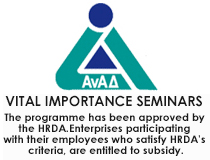Developing eLearning lessons with Dynamic Instructional Design Methods

Instructor
-
 Chryso ChristodoulouCEO - Founder
Chryso ChristodoulouCEO - FounderMrs. Chryso Christodoulou is the founder of FUNecole® Research Institute and the co-founder of Digipro Education Limited. Her academic background is in Computer Science and Education. She is the designer and author of the FUNecole® for Cambridge ICT Starters Initial Steps endorsed by University of Cambridge International Examinations and recognized best practice educational approach by the European Commission. Mrs. Christodoulou is an external educational expert for the Institute of Prospective Technological Studies (IPTS) on various educational research projects. She is a program committee member for the Institute of Electrical and Electronics Engineers’ (IEEE) Computer society. Mrs. Christodoulou participates as keynote speaker and panelist at numerous conferences, seminars and workshops around the world. Mrs. Christodoulou´s work has been published in scholarly and policy publications, such as IEEE Xplore and the European Parliament Magazine. She is a recognized as an entrepreneurship expert by OECD and is one of 350 European Ambassadors of Entrepreneurship.

Recent Participants

Date
- Nov 24 - 25 2020
- Expired!
Cost
- Fully Subsidized
Location
The unexpected uncertainties surrounding the recent invasion of COVID-19 pandemic brought forward unprecedented challenges that affect global education. We are living amidst what is potentially one of the greatest threats in our lifetime, a gigantic educational crisis. According to the World Bank, as of March 28, 2020, the COVID-19 pandemic caused more than 1.6 billion young students out of school in 161 countries. This is close to 80% of the world’s enrolled students. Not since World War II have we witnessed so many countries and their schools go into simultaneous lockdown for the same reason. The impact of this virus is predicted to be far-reaching and no one can foresee its effects on education in the longer term. Whilst education needed major reforms the COVID-19 pandemic, has pushed forward -even more so- the absolute necessity for educational disruption and online solutions that have to: (a) be interesting for the targeted group of students as well as their teachers so to ensure their sufficient interaction with the new (on-line) process; (b) ensure a critical mass of educational results/progress so to secure the cognitive development of young students; (c) prepare the young students for the professional life and the market of the future, namely the professional life and the market of 2035 and beyond (support new ways of thinking and new emotional capabilities).
The COVID-19 has a great impact on teachers and schools as they use web-based learning platforms and build connections with students, teachers and other schools to formulate global conversations. Teachers although skillful enough are lacking behind in the methodologies for “Online Teaching and Learning”. Within the scope of this seminar, participants will be offered comprehensive training, ongoing coaching and technical support to ensure their readiness to cope with the design and implementation of eLearning lessons/courses that contribute towards quality in education that leads to higher student achievements.
The Instructional Design for eLearning course will be useful for instructional designers (educators and curriculum consultants) at any level of education and of any professional experience. This seminar will offer valuable insight to owners Junior, Middle and High school principals/managers, educational curriculum consultants and master trainers of private middle and high schools and Educational Institutes.
This expert educator professional development workshop aims to provide Junior, Middle and High school principals/managers, educational curriculum consultants with the latest state of the art tools, platforms and educational pedagogies that will fully support them to acquire the following types of knowledge, skills and attitude-related objectives:
Knowledge-related objectives
- Gain knowledge and acquire skills to design eLearning interactions that increase learning effectiveness and decrease costs.
- Learn how to evaluate the information veracity, reason logically, come to evidence-based decisions.
- Create relevant new knowledge and apply learning to new situations;
- Gain knowledge on how to offer students online meaningful, real, rich and relevant learning experiences for a technology-rich world and culturally diverse modern societies.
Skills-related objectives (Be able to)
- Analyze, design, develop, implement and evaluate one’s own eLearning courses.
- Monitor the online student progress, engagement in solving individual and collaborative problems.
- Support the online organization of student activities and assessments according to international curriculum standards.
- Explore current theories, principles, methodologies, and techniques of online learning.
- Create interactive eLearning experiences that meet your learners’ needs.
- Develop effective online assessment tools.
- Design Web2.0 and Mobile Learning solutions.
- Create student eLearning portfolio.
- Create design documents, storyboards and prototypes to support eLearning experiences.
Attitude-related objectives
- Use various data-collection methods and techniques to conduct needs analysis for your eLearning courses.
- Demonstrate knowledge, skills, and creativity related to eLearning instructional design.
- Design interactivity, games, simulations, job aids, and graphics.
- Collaborate effectively with Subject Matter Experts (SMEs).
- Manage eLearning projects effectively and efficiently using traditional and agile methodologies.
- Select appropriate performance improvement interventions.
Day 1: 07:00-07:30 | Arrival & Registration |
| 07:30 – 09:30 | I. Support the technical infrastructure necessary for online learning.
II. Support the curation and delivery of content that promotes active learning.
III. Provide equitable online learning opportunities in the face of the COVID-19 pandemic. Learn how to:
|
| 09:30-09:45 | Coffee Break |
| 09:45 -12:15 | IV. Select the most appropriate ISD model for the online lesson/course.
Case Studies:
|
| 12:15-13:00 | Lunch Break |
| 13:00-14:00 | Select appropriate presentation methods and techniques that adhere to the Nine Events of Instruction
Case Study. Use Robert Gagné’s Nine Events of Instruction to design effective learning experiences. |
| 14:00-14:15 | Coffee Break |
| 14:15-15:45 | Design and develop storyboards and lesson prototypes.
|
Day 2: 07:00-07:30 | Arrival |
| 07:30-09:30 | I. Differentiate between the four levels of interactivity and select the most appropriate level for the online lessons/course
II. Produce the eLearning videos for the online lesson/course
Case Study:
III. Incorporate social networking tools in eLearning courses
|
| 09:30-09:45 | Coffee Break |
| 09:45-12:15 | IV. Integrating reliable assessment recourses.
V. Design learning games and videos.
Case Study: Design effective graphics for your courses using Ruth Clark’s visual design model |
| 12:15-13:00 | Lunch Break |
| 13:00-15:00 | VI. Incorporate social networking tools in eLearning courses
VII. Group Project. |
| 15:00-15:15 | Break |
| 15:15-15:45 | Present group projects that contain learning experiences beyond expectations driven by authentic passion and need. |
The event is finished.

SUBSIDY, ATTENDANCE, AND CANCELLATION POLICY
HRDA Subsidy and Seminar Attendance
- A company’s participant is eligible for a subsidy when their Social Insurance and Industrial Training contributions have been settled in full by the time of registration/seminar. In case of ineligibility/disqualification, the company will be invoiced the full amount per participant.
- A company’s participant is eligible for a subsidy if he/she completes an obligatory attendance of 75% or more (both during seminar and company visit). In case of failure to complete the attendance, the company will be invoiced the full amount, per participant.
Cancellation and Substitution Policy
- Cancellations can be accepted up to 5 working days prior to the seminar without penalties. For any cancellations received after the deadline (or no-shows), the company will be invoiced the full amount per participant.
- Substitutions can be accepted any time prior to the seminar without penalties.
- Τhroughout the seminar participants must have their camera and microphone open, for better communication and as defined by the specifications of HRDA otherwise participants will not be approved by HRDA.

